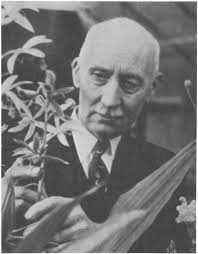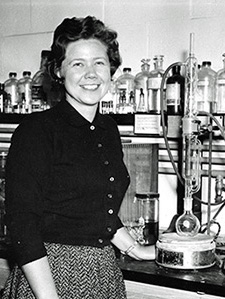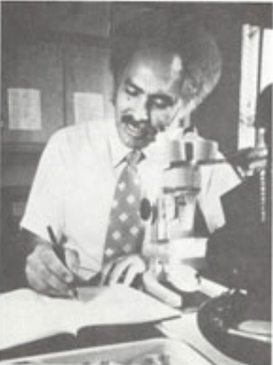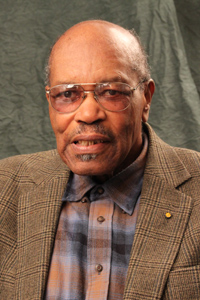
Thomas Wyatt Turner was an American civil rights activist, biologist, and educator. He was the first Black American to receive a Ph.D. in botany, and helped found both the NAACP and the Federated Colored Catholics.
Charles Vancouver Piper was an American botanist and agriculturalist. Born in Victoria, British Columbia, Canada, he spent his youth in Seattle, Washington Territory and graduated from the University of Washington Territory in 1885. He taught botany and zoology in 1892 at the Washington Agricultural College in Pullman. He earned a master's degree in botany in 1900 from Harvard University.
Gilbert L. Voss was an American conservationist and oceanographer. He was one of the main persons behind the establishment of John Pennekamp Coral Reef State Park in Key Largo, Florida and he spoke out successfully against several proposed real estate developments that might have threatened the ecology of the Florida Keys.
Henry J. Oosting was an American ecologist and professor. He was born in Holland, Michigan. Oosting attended Michigan State University, where he received the M.S. degree in 1927, then studied with W.S. Cooper at the University of Minnesota, receiving his Ph.D. in botany in 1931, among other notable Cooper students including Murray Fife Buell, Rexford F. Daubenmire, Frank Edwin Egler, and Jean Langenheim. In 1932, Oosting began his career at Duke University as ecologist in the Department of Botany.
Richard Sumner Cowan was an American botanist.

Kamaljit Singh Bawa, FRS is an evolutionary ecologist, conservation biologist and a distinguished professor of Biology at the University of Massachusetts, Boston. He is also the founder of Ashoka Trust for Research in Ecology and Environment (ATREE). In 2012, Bawa received the first Gunnerus Sustainability Award, the world's major international award for work on sustainability. He is an elected member of the American Academy of Arts and Sciences. He was elected a Member of the American Philosophical Society in 2019.

Leslie David Gottlieb (1936–2012) was a United States biologist described by the Botanical Society of America as "one of the most influential plant evolutionary biologists over the past several decades". He was employed at the University of California, Davis for 34 years, and published widely. In addition to his primary work in plant genetics, Gottlieb was an advocate for rare and endangered plant conservation.
Pamela Soltis is an American botanist. She is a distinguished professor at the University of Florida, curator at the Florida Museum of Natural History, principal investigator of the Laboratory of Molecular Systematics and Evolutionary Genetics at the Florida Museum of Natural History, and founding director of the University of Florida Biodiversity Institute.
The Association of Southeastern Biologists (ASB) is a scientific professional organization in the southeastern United States focused on promoting research and education across the biological sciences. The ASB hosts an annual meeting featuring paper and poster sessions, workshops, and symposia across a variety of biological disciplines. The ASB also issues the yearly publication Southeastern Biology.
Elva Lawton was an American botanist and bryologist known for her research on ferns early in her career and her late-career comprehensive study of the mosses of the Western United States.
Michael Donoghue is an American evolutionary biologist, currently the Sterling Professor of Ecology and Evolutionary Biology at Yale University, and also a published author.
Dan Henry Nicolson (1933–2016) was a botanist known particularly for his work on the Araceae, and for his contributions to botanical nomenclature. He is honoured by the International Association for Plant Taxonomy with the Dan Nicolson Fund, set up to provide a research grant each year.
Nathaniel Lyon Gardner, was an American phycologist and mycologist who taught at the University of California, Berkeley, where he was the curator of the University Herbarium. He is known for his work on seaweeds of the Pacific Coast, as well as on freshwater algae and fungi, and among his publications is the important reference work Algae of Northwestern America.

Hugo Leander Blomquist was a Swedish-born American botanist. His well rounded expertise encompassed fungi, bacteria, bryophytes, algae, grasses, and ferns. The standard author abbreviation H.L.Blomq. is used to indicate this person as the author when citing a botanical name.

Donald Richard Ort is an American botanist and biochemist. He is the Robert Emerson Professor of Plant Biology and Crop Sciences at the University of Illinois at Urbana-Champaign where he works on improving crop productivity and resilience to climate change by redesigning photosynthesis. He is a member of the National Academy of Sciences (NAS) and a fellow of the American Association for the Advancement of Science (AAAS) and American Society of Plant Biologists (ASPB).

Jean H. Langenheim was an American plant ecologist and ethnobotanist, highly respected as an eminent scholar and a pioneer for women in the field. She has done field research in arctic, tropical, and alpine environments across five continents, with interdisciplinary research that spans across the fields of chemistry, geology, and botany. Her early research helped determine the plant origins of amber and led to her career-long work investigating the chemical ecology of resin-producing trees, including the role of plant resins for plant defense and the evolution of several resin-producing trees in the tropics. She wrote what is regarded as the authoritative reference on the topic: Plant Resins: Chemistry, Evolution, Ecology, and Ethnobotany, published in 2003.
Charles Stewart Parker was head of the Department of Botany at Howard University. He carried out the first systematic study of American species of the fungal genus Hypholoma and also collected over 2000 plant specimens, including several new species.

O'Neil Ray Collins was an American botanist, mycologist, and specialist in slime-mold genetics.
Robin B. Foster is a botanist studying tropical forests. He co-originated the "tropical forest dynamics plot".
Margaret Young Menzel was a geneticist known for her research on chromosomes and meiosis in a range of organisms including tomatoes, flowering plants, and worms. Menzel was also an advocate for equal opportunities for women and led a 1972 class action suit against Florida State University.







